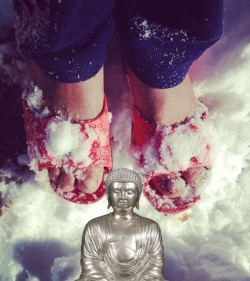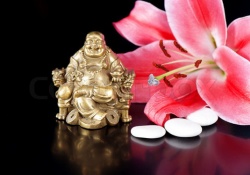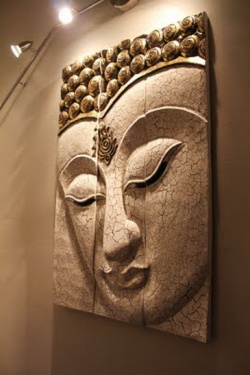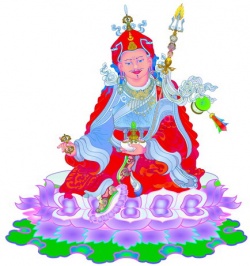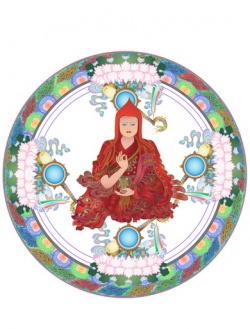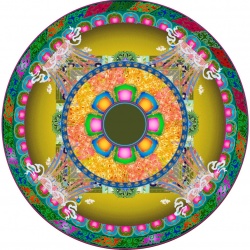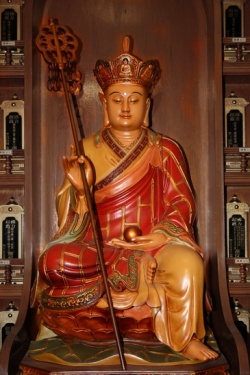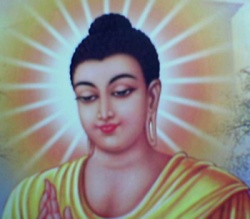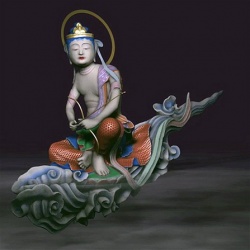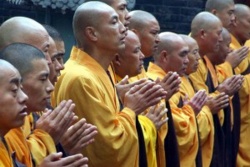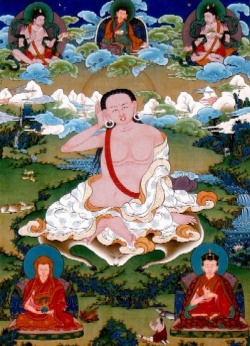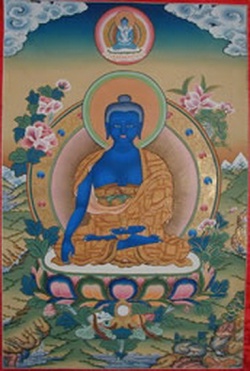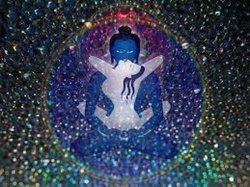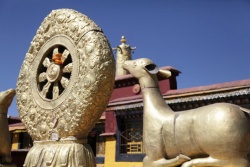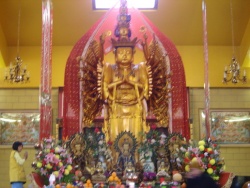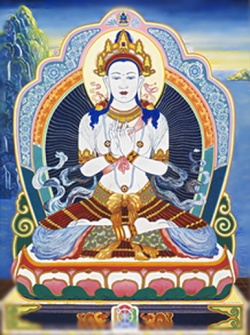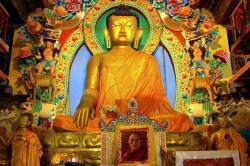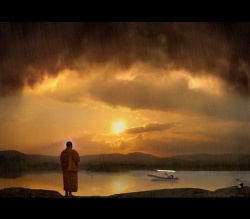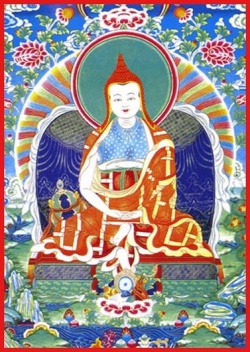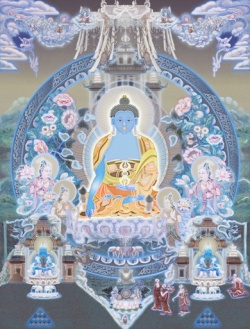Nirvana Sutra: Chapter Forty: On Bodhisattva Kasyapa (a)
Mahayana Mahaparinirvana Sutra
Translated by KOSHO YAMAMOTO
FROM Dharmakshema's Chinese version
The World's genuinely first-ever web edition of this complete scripture
(This "Yamamoto/page edition" is Copyright of Dr. Tony Page, 2004 )
The Complete Kosho Yamamoto English Translation of the "Nirvana Sutra", edited and revised by Dr. Tony Page, typographically improved by Jay and Gabriele Mazo
Chapter Forty: On Bodhisattva Kasyapa (a)
Bodhisattva Kasyapa said to the Buddha: "O World-Honoured One! The Tathagata truly pities all beings. You adjust well what is not adjusted, make the impure pure, give refuge to the person who has no refuge, and give Emancipation to the person who is not yet emancipated. You have eight unmolestednesses (unrestrictednesses), you are the Great Doctor, and you are the King of Medicine. Bhiksu Sunaksatra was a son of the Buddha when as yet a Bodhisattva. After renunciation, he upheld, recited, discriminated and expounded the 12 types of sutra, destroyed the bonds of the world of desire and gained the four dhyanas (deep meditations). Why is it that you the Tathagata should prophesy that Sunaksatra is one lower than the icchantika, one who lives long in hell, one irremediable? Why, O Tathagata, do you not, for his sake, speak about Wonderful Dharma and then later speak for the sake of the Bodhisattvas? O Tathagata-World-Honoured One! If you cannot save Bhiksu Sunaksatra, how can we say that you have Great Loving-Kindness and great expedients?"
The Buddha said: "O good man! To illustrate: a father and mother couple have three sons. One is obedient, respects his parents, is sharp and intelligent, and knows well of the world. The second son does not respect his parents, does not have a faithful mind, is sharp and intelligent, and knows well of the world. The third son does not respect his parents, and has no faith. He is dull-witted and has no intelligence. When the parents wish to impart a teaching, who should be the first to be taught, who is to be loved, to whom do the parents need to teach the things of the world?"
Bodhisattva Kasyapa said: "First must be taught the one who is obedient, who respects his parents, who is sharp and intelligent, and who knows what obtains in the world. Next, the second and then the third (son). And although the second son is not obedient, for the sake of loving-kindness this son should be taught next." "O good man! It is also the same with the Tathagata. Of the three sons, the first may be likened to the Bodhisattva, the second to the sravaka, and the third to the icchantika. I have already spoken to the Bodhisattvas all about the details of the 12 types of sutra, and of what is shallow and near to the sravakas, and of what obtains in the world to the icchantikas and to those of the five deadly sins. What obtains in the present does not benefit the person. But I would teach because of loving-kindness and for what may result in days to come. O good man! It is like three kinds of field. One is easy to irrigate. There is no sand there, no salt, no gravel, and no stones, and no thorns. Plant one, and one gains 100. The second also has no sand, no salt, no gravel, no stones, and no thorns. But irrigation is difficult, and the harvest is down by half. The third gives difficulties with irrigation, and it is full of sand, gravel, stones, and thorns. Plant one, and one gains one, due to the straw and grass. O good man! In the spring months, where will the farmer plant first?"
"O World-Honoured One! First, the first field, second, the second field, and third, the third field."
"The first can be likened to the Bodhisattva, the second to the sravaka, and the third to the icchantika."
"O good man! It is as with three vessels. The first is perfect, the second leaks, and the third is broken. When one wishes to put milk, cream or butter into them, which one would one use first?"
"O World-Honoured One! We would use the one which is perfect; next, the one that leaks, and then the broken one."
"The perfect and pure one is comparable to the Bodhisattva-priest; the one that leaks to the sravaka, and the one that is broken to the icchantika. O good man! It is as in the case of three sick persons who go to the doctor. The first is easy to cure, the second difficult to cure, and the third, impossible to cure. Whom will the doctor cure if he has to cure (any of them)?"
"O World-Honoured One! First he will cure the one who is easy to cure; next, the second person, and then the third person. Why? Because of the fact that they are related."
"The person who is easy to cure is analogous to the Bodhisattva; the one difficult to cure to the sravaka-priest, and the one impossible to cure to the icchantika. In the present life, there will not come about any good fruition. But by comparison and for the ages to come, all good seeds are cultivated. O good man! For example, a great king has three horses. One is trained, is in the prime of life and possesses great strength; the second has no training, no good teeth, is not in the prime of life and does not have great strength; the third has no training, is weak, old, and has no strength. If the king wishes to go riding, which one will he use?"
"O World-Honoured One! First, the trained one, which is in perfect health and which possesses great strength; then, the second and the third."
"O good man! The trained one, which is in the prime of life and has great strength, can be likened to the Bodhisattva-priest, the second to the sravaka-priest, and the third to the icchantika. Though no good comes about (for the icchantika) in this present life, it is done (i.e. he is taught) out of loving-kindness and also to sow the seed for the days to come. O good man! It is as when great dana (giving) is performed when three persons come. One of them is of noble birth and has a good mind and upholds the precepts. The second is of the middle caste, is dull, but upholds the precepts. The third is of low caste, is dull, and violates the precepts. O good man! To whom will this great danapati (giver) give first?"
"O World-Honoured One! To the person of noble birth, who is sharp-witted and who upholds the precepts; next, to the second person, and, then, to the third."
"The first person is comparable to the Bodhisattva-priest, the second to the sravaka-priest, and the third to the icchantika. O good man! When a great lion kills a gandhahastin, he uses all his strength. Even when killing a hare, he does not have a light thought. It is also the same with the All-Buddha-Tathagata. When addressing all Bodhisattvas and icchantikas, he does not do things in two ways. O good man! I once lived in Rajagriha, when the bhiksu, Sunaksatra, served me as an attendant. In the early part of one evening, I spoke to Devendra about the essence of Dharma. It is the way of a disciple to go to bed later. Then, Sunaksatra, as I sat up a long time, had an evil thought. In those days in Rajagriha, when small boys and girls cried and would not stop, the parents would say: "If you don't stop crying, we shall give you to the devil, Vakkula." Then, Sunaksatra, getting a dishonest thought, said to me: "Please speed to samadhi. There comes Vakkula!" I said: "You blockhead! Do you not know that the Tathagata-World-honoured One never has any fear?" Then, Devendra said to me: "O World-Honoured One! Can someone like that also get into the Buddha's group?" I said: "O Kausika! Such persons can gain the Buddhist teaching; they too possess the Buddha-Nature. They will attain unsurpassed Enlightenment." I spoke to this Sunaksatra about Dharma. But he had no faith in me and did not take in anything I said.
"O good man! I once lived in the state of Kasi, at Sivapura (= Varanasi). The bhiksu, Sunaksatra, served me as attendant. I then went into the castle, meaning to beg for alms. Innumerable people vacantly (without any set purpose) followed me wherever I went. Bhiksu Sunaksatra, on following me, wanted to drive them away, but was unable to do so. Instead, the people gained a non-good mind. Entering the castle, I saw a Nirgrantha in a wine shop, sitting hunchbacked on the ground and partaking of liquor lees. Bhiksu Sunaksatra, on seeing this, said: "O World-Honoured One! If ever there was an arhat, this is the greatest. Why? Because he says that there is no cause and no return to actions performed." I said: "O blockhead! Have you never heard it said that an arhat does not drink, does not cause any harm to others, does not cheat, does not rob, and does not have any sexual intercourse? Such persons as this kill their parents and partake of liquor lees. How can one call such a man an arhat? This man will assuredly fall into Avichi Hell. An arhat is eternally segregated from the three unfortunate realms. How can you call such a man an arhat?" Sunaksatra said: "We might well be able to change the natures of the four great elements, but it is impossible to make this person fall into Avichi Hell." I said: "O blockhead! Have you never heard that the All-Buddha-Tathagata truly never uses two words (i.e. speaks falsely)?" I spoke thus, but he would not believe my words.
"O good man! I once lived in Rajagriha with Sunaksatra. At that time, there was a Nirgrantha in the castle-town who was called "Sorrow-Ridden". He always said: "The defilement of a being has no direct or indirect cause. The emancipation of us beings also has no direct or indirect cause." Bhiksu Sunaksatra said: "O World-Honoured One! If anyone is an arhat, this Sorrow-Ridden is the greatest." I said: "You blockhead! The Nirgrantha, Sorrow-Ridden, is no arhat. He cannot understand the way of an arhat." Sunaksatra further asked: "Why does an arhat become jealous of another arhat?" I said: "O you blockhead! I have no jealousy towards any person. It is only that you have distorted notions. If you mean to say that Sorrow-Ridden is an arhat, he will suffer from indigestion, have stomach-ache, die, and, after death, he will be born amongst hungry pretas (ghosts), and his comrades will carry his corpse and place it in Sitavana." Then, Sunaksatra went to the Nirgrantha and said: "O Learned One! Do you know or not that Sramana Gautama prophesies that you will suffer from indigestion, get a pain in your stomach and die, and that after your death, you will be born among hungry pretas, and that your comrades and teachers will carry your corpse and place it in Sitavana? O Learned One! Think well and effect expedients and make Gautama see that he is telling lies." Then, Sorrow-Ridden, on hearing this, fasted. This continued from the first to the sixth day. On the seventh day, he completed his fast and took some molasses. After eating this, he drank some cold water, got a pain, and died. After death, his comrades carried his dead body to Sitavana. He gained the body of a hungry preta and sat along with the corpses. Sunaksatra, on hearing of this, went to Sitavana. He saw that Sorrow-Ridden was in the form of a hungry preta, living by the side of a corpse and squatting on the ground. Sunaksatra said: "Are you dead, O great one?" Sorrow-Ridden said: "I am dead." "How did you die?" "I died from a pain in my stomach." "Who carried your dead body?" He answered: "My comrades." "After carrying you, where did they place you?" "O you blockhead! Do you not know that I am in Sitavana? I have now been born as a hungry preta. Listen well, O you Sunaksatra! The Tathagata speaks good things, true words, timely words, meaningful words, and the words of Dharma. O you Sunaksatra! The Tathagata brings to mouth such true words. Why did you not believe his words? Anyone who does not believe in his true words will gain the (kind of) body that I now have." Then, Sunaksatra came back to me and said: "O World-Honoured One! The Nirgrantha, Sorrow-Ridden, has died and been born in Trayastrimsa Heaven." I said: "O you blockhead! There is no place where an arhat gains birth. How can you say that Sorrow-Ridden has now been born in Trayastrimsa Heaven?" "O World-Honoured One! Truth to tell, the Nirgrantha, Sorrow-Ridden, has not been born in Trayastrimsa Heaven. He has now gained the body of a hungry preta." I said: "O you blockhead! The All-Buddha-Tathagata speaks only truth and is not double-tongued. Never say that the Tathagata uses two words." Sunaksatra said: "The Tathagata spoke thus at the time, but I did not believe you." O good man! Although I spoke what was true to Sunaksatra, he never once had a mind to believe me. O good man! Although Sunaksatra recites the 12 types of sutra and gains the four dhyanas, he does not know the meaning of a gatha, a line, or a word. On associating with an evil friend, he lost the four dhyanas. Losing the four dhyanas, he gained an evil notion and said: "There is no Buddha, no Dharma, and no Nirvana. Sramana Gautama sees one's future phrenologically. So does he well read the mind of others." I then said to Sunaksatra: "What I speak is good all through, from the beginning, through the middle, to the end. Whatever words I use are deftly chosen; the meaning is true. In what is said, there is nothing that is mixed up. I am perfect in pure actions." Sunaksatra again said: "Though the Tathagata spoke of Dharma for my sake, I said that there were truly no causal relations." O good man! If you do not believe me, go to Sunaksatra, who is now living by the River Nairanjana. Go and ask him."
Then, the Tathagata and Kasyapa together went to where Sunaksatra was living. Bhiksu Sunaksatra saw the Buddha coming from afar. On seeing him, he gained an evil mind. Due to this evil mind, he fell living into Avichi Hell.
"O good man! Bhiksu Sunaksatra was once in the treasure house of the Buddhist teaching. All meant nothing; he gained nothing; not a single benefit of Dharma did he gain. This comes from indolence and from an evil friend. For example, a person goes into the sea and sees many treasures, but gains nothing. This comes from indolence. The case is thus. Once he goes into the sea and sees the treasures, he gets himself killed, or is killed by a devil rakshasa (flesh-devouring demon). It is the same with Sunaksatra. He entered into the teaching, but was killed by a great rakshasa, an evil teacher of the Way. O good man! For this reason, the Tathagata, out of compassion, always told Sunaksatra that he had too much indolence.
"O good man! If (a person is) poor, I may have pity but a little. If a person was once rich, but has now lost his wealth, I pity (that person) very much. It is the same situation with Sunaksatra. He upheld, recited (the scriptures) and attained the four dhyanas, and then he lost them. This is a great pity. So I say: "Sunaksatra has a great deal of indolence." Having much indolence, he is away from all good deeds. Whenever my disciples see or hear of him, there are not a few who gain pity for this person. It is as with the person who first had a lot of wealth and later lost it. For many years I lived with Sunaksatra. Yet he always had an evil mind. And because of this evil mind, he was unable to forsake twisted views of life. O good man! Since of old I have seen in Sunaksatra just a hair's amount of good, but he has lost it. But I have never yet prophesied that he was an icchantika, the lowest, and one who would have to live for a kalpa in hell. By saying that there never exists any cause or result or action, he has long cut off the root of good. Such is the icchantika, the lowest, and one who has to live for a kalpa in hell. Thus have I prophesied.
"O good man! There is a man who drowns in the privy. A good teacher of the Way has people search for him with their hands. Grabbing a hair of (his head), he means to pull him out. He searches for him for a long time, but without success. And he gives up. It is the same with me. Looking for just a little bit of good in Sunaksatra, I wished to save him. For the whole day I tried, but could not even gain hold of a hair's amount of good in him. That was why I could not get him out of hell."
Bodhisattva Kasyapa said: "O World-Honoured One! Why did you prophesy that he would go to Avichi Hell?"
"O good man! Bhiksu Sunaksatra had many kindred with him. They all said that Sunaksatra was an arhat and that he had attained the Way, so that he could crush out twisted minds. I prophesied that Sunaksatra would go to hell due to indolence. O good man! Know that what the Tathagata says is true and that it is not two (duplicitous). Why? For there can never be any case where, when the Buddha has prophesied that a person would go to hell, the person failed to go there. There are two kinds of what the sravakas and pratyekabuddhas prophesy: either false or true. Maudgalyayana said to all in Magadha: "There will be rain in seven days." The time passed, and there was no rain. Later he prophesied: "This cow will bring forth a white calf." But what came out was a unicorn. This is like saying that a male will come out when a female comes out. O good man! Bhiksu Sunaksatra spoke to innumerable beings and always said that there came about no good or evil karmic results. Through this, he cut off all the roots of good eternally, and there did not remain a hair's worth of good left (in him).
"O good man! I knew for a long time that this Bhiksu Sunaksatra would eternally cut off the root of good. But for 20 long years we lived together. If I had kept myself away from him and never come near him, this man would speak to innumerable beings, thus teaching others to do evil. This is what we call the Tathagata's fifth power of understanding."
"O World-Honoured One! Why is it that the icchantikas do not possess good?"
"O good man! Because the icchantikas are cut off from the root of good. All beings possess such five roots as faith, etc. But the people of the icchantika class are eternally cut off from such. Because of this, one may well kill an ant and gain the sin of harming, but the killing of an icchantika does not (constitute a sin)."
"O World-Honoured One! The icchantika possesses nothing that is good. Is it for this reason that such a person is called an "icchantika"?
The Buddha said: "It is so, it is so!"
"O World-Honoured One! All beings possess three kinds of good, namely those of: 1) past, 2) future, and 3) present. Even the icchantika cannot cut off the good of the days to come. How can one say that one who cuts off all good is an icchantika?"
"O good man! Of disruption , there are two kinds. One is the disruption in the present, and the other is what hinders the present and the future. The icchantika is perfect in these two disruptions. That is why I say that the icchantika is cut off from all the roots of good. O good man! For example, there is a man who drowns in the privy, and only a single hair remains that has not sunk down. And this hair cannot be greater than the body. It is the same with the icchantika, too. He may well possess the possibility of amassing good in the days to come, but this cannot relieve him from the pain of hell. He may be saved in the days to come, but he cannot be now. That is why we say unsavable. The causal relations of the Buddha-Nature will save (him). The Buddha-Nature is not of the past, of the future, or of the present. Thus, this Buddha-Nature cannot be made away with. A rotten seed cannot call forth a bud. The same is the situation with the icchantika, too."
"O World-Honoured One! The icchantika is not segregated from the Buddha-Nature. The Buddha-Nature is that which is good. How can we say that all good is cut off?"
"O good man! If a being possesses now the Buddha-Nature, such a person is no icchantika. It is as in the case of the nature of the Self. The Buddha-Nature is what is Eternal. It does not fall within the category of the Three Times. If it were in the category of the Three Times, it would be non-eternal. The Buddha-Nature is what will be seen in days to come. So, we can say that beings possess the Buddha-Nature. On this account, the Bodhisattva of the ten stages can see partly due to the fact that he is perfectly adorned."
Bodhisattva Kasyapa said: "O World-Honoured One! The Buddha-Nature is Eternal; it is like space. Why is it that the Tathagata says that it can have the future? You, the Tathagata, say that the icchantika has no root of good. Can the icchantika not love his comrades, teachers, parents, relatives, wife and children? If so, is it not the case that he has an act of good?"
The Buddha said: "Well said, well said, O good man! You do well to put such a question. The Buddha-Nature is like space. It is not past, not future, and not present. Beings can perfect the pure body in the days to come and can accomplish themselves and gain the Buddha-Nature. That is why I say that the Buddha-Nature is a thing of the days to come. O good man! I, at times, for the sake of beings speak of the cause and say that it is the result; at times, I speak of the result and say that it is the cause. Because of this, I say in the sutras that life is food and that material form (“rupa”) is touch (“sparsa”). The body of the days to come will be pure. Hence, the Buddha-Nature."
"O World-Honoured One! If things are as the Buddha says, why do you say: "All beings possess the Buddha-Nature?"
"O good man! Although there is no present of the Buddha-Nature of beings, we cannot say that it does not exist. Though, by nature, there is no present of space, we cannot say that there is not (space). The case is thus. Though all beings are non-eternal, this Buddha-Nature is Eternal and cannot suffer change. That is why I say in this sutra: "The Buddha-Nature of beings is not in and not out; it is as in the case of space, which is neither in nor out." If there were in and out in space, we could not say that space is one and eternal; nor could we say that it exists everywhere. Although space exists neither in nor out, all beings possess it. The same is the case with the Buddha-Nature of beings, too. You say that the icchantika has a cause of good. This is not so. Why not? Whatever he does with body, mouth and mind, and whatever he obtains, seeks, gives or comprehends is all evil in nature. Why? Because these do not ride on the law of cause and effect. O good man! The Tathagata is perfect in the knowledge and power relative to all dharmas. So, he knows well the differences between the top, middle and low qualities of all beings. He indeed knows that (i.e. whether) a person turns low into middle, middle into top, top into middle, and middle into low. For this reason, know that there cannot be any fixedness in the qualities of beings. Being not fixed, the good is lost; and when it is lost, the person gains it again. If it were the case that the root quality of a being were fixed, once (the good had been) lost, it would never come back. Also, we must not say that the icchantika falls into hell and that life in hell is one kalpa (i.e. aeon) long. O good man! That is why the Tathagata says that no state is fixed in existence."
Bodhisattva Kasyapa said to the Buddha: "O World-Honoured One! You, the Tathagata, with the power of being able to know all things, see that Sunaksatra is certain to lose all the roots of good. Why do you permit him to be in the Sangha?"
The Buddha said: "O good man! In the past when I left home, my younger brother, Nanda, my cousins, Ananda and Devadatta, and my son, Rahula, all followed in my footsteps and renounced the world and (secular) life and practised the Way. If I had not allowed him to join the Sangha, he would have come to the throne. Gaining unrestricted power, he would have destroyed the Buddhist teaching. For this reason, I allowed him to enter the Sangha. O good man! If he had not entered the Sangha, he would have been far away from the root of good, and for innumerable ages to come he would have destroyed the Buddhist teaching. For this reason, he is now in the Sangha. Though he possesses no good, he upholds the precepts and respects the elders, the aged, and the virtuous, and makes offerings, and can practise dhyanas from the first to the fourth. This is a cause of good. Any such good cause will bring forth what is good. When good comes about, he will well practise the Way, and through this, he will attain unsurpassed Enlightenment. Because of this, I permitted Sunaksatra to enter the Sangha. O good man! If I had not permitted Sunaksatra to be ordained and receive sila, I could not be said to possess the Tathagata's ten powers.
"O good man! The Buddha sees that a being possesses things both good and not good. Although a man possesses (such) two things, he soon severs himself from the roots of good and possesses what is not good. Why? Because such a person does not befriend a good teacher of the Way, does not give ear to Wonderful Dharma, does not think well, and does not act as he ought to act. He thereby severs himself from good and performs what is not good. O good man! The Tathagata knows that this person, in this life or in the next life, when small, in the prime of life, or in old age, will befriend a good friend, give ear to Wonderful Dharma, to suffering, to the cause of suffering, to extinction, and the Way leading to the extinction of suffering, and then he will come back again and do good.
"O good man! For example, there is a spring which is not far from a village. The water is sweet and beautiful, and possesses eight virtues. There is a man there who is very thirsty and desires to be by the spring. There is a wise person, who thinks that the thirsty man will unfailingly hasten to the spring, because he sees that the way to it is not difficult. The case is thus. So does the Tathagata-World-Honoured One see beings. On this account, we say that the Tathagata is perfect in the power of knowing all things relative to all beings."
Then, the World-Honoured One took up a small bit of earth and deposited it on his fingernail, saying to Kasyapa: "Is this bit of earth, or that of the ten directions, greater?" Bodhisattva Kasyapa said to the Buddha: "O World-Honoured One! The earth on your fingernail cannot be compared to the earth of the ten directions." "O good man! One abandons one's body and gains a body again; one casts aside the body of the three unfortunate realms (i.e. the realms of hell, hungry ghosts, and animals) and gains another body. And when all the sense-organs are perfect, one gains life in the Middle Country, gains right faith, and practises well the Way. Practising well the Way, one indeed practises the Right Way. Practising the Right Way, one attains Emancipation, and then one truly enters Nirvana. This is like the earth on my fingernail. One casts away one's body and gains one of the three unfortunate realms. One casts away the body of the three unfortunate realms and gains the body of the three unfortunate realms (again). One is not perfect in all one's sense-organs, one gains life in an out-of-the-way (remote) place, holds an upside-down view of life, follows a twisted way, and does not attain Emancipation and Nirvana. All of this may be likened to the earth of the ten quarters.
"O good man! One who upholds the precepts always makes effort, does not commit the four grave offences, does not perform the five deadly sins, does not use the things that belong to the Sangha, does not become an icchantika, and does not segregate his self from all the roots of good. Such a person who believes in this Nirvana Sutra can be likened to the earth on my fingernail. Those who violate the precepts, those who are indolent, those who commit the four grave offences, those who perform the five deadly sins, those who use the things of the Sangha, those who become icchantikas, those who cut off all the roots of good, and those who do not believe in this sutra are as great in number as the earth in the ten directions. O good man! The Tathagata knows well all about the qualities of beings of the top, middle and low (positions). Because of this, we say that the Buddha is perfect in the power of being able to see through to the root of all things."
Bodhisattva Kasyapa said to the Buddha: "O World-Honoured One! The Tathagata possesses this power of seeing through to the root of things. Because of this, he truly knows the sharp and dull, and the differences in qualities of the top, middle and bottom of beings, and also knows well the root qualities of the beings of the present world and also those of the beings of the future. Such beings, when the Buddha is gone, will say that the Tathagata has ultimately entered Nirvana or that he has not ultimately entered Nirvana. Or they might say that there is the Self or that there is no Self. Or they may say that there is an in-between existence or that there is no such; or that there is retrogression or that there is not; or that the Tathagata possesses a created body or that what he possesses is one uncreated; or that the 12 links of interdependent arising are of the created or that causal relations are the non-created; or that the mind is eternal or that it is non-eternal, or that when one partakes of the joy of the five desires, this hinders the Holy Way or that it does not; or that laukikagradharma ("first-of-the-world-root-of-good", or "prime-in-the-world condition" - the fourth and highest “nirvedha-bhaga”, intellectual penetration, insight) is but of the world of desire or that it concerns the three unfortunate realms; or that dana is a thing of the mind, or that it belongs to the realm of the five skandhas. Or they will say that there are three non-created (things), or that these do not exist. Or they will say that there is created "matter", or that there is no such thing; or that there is a non-created matter, or that there is nothing such as that. Or they will say that there are the mental functions, or that there is nothing such. Or they will say that there are the five kinds of "is", or that there are six such; or that if one is perfect in the eight purifications (“astangasamanvagatopavasa”) and the upasaka (lay Buddhist) silas, one can well gain (benefit), or that one can well gain (such) even if one is not quite perfect in these observances. Or it will be said that even when a bhiksu has committed the four grave offences, there is yet sila (morality) for that bhiksu, or that there is not. Or they will say that all the srotapannas, sakrdagamins, anagamins, and arhats arrive at what Buddhism aims at, or that this is not so. Or they will say that the Buddha-Nature is with the being from birth, or that it exists apart from the being. Or it will be said that the Buddha-Nature must exist even with such kinds of people as those who have committed the four grave offences, those of the five deadly sins, and with the icchantika, or that they do not possess such. Or they will say that there are the Buddhas in the ten directions, or that there are no Buddhas in the ten directions. If the Tathagata is perfect in the power of seeing through the natures of beings, why does he not state definitely about it (i.e. these matters)?"
The Buddha said to Kasyapa: "O good man! Any such is not what eye-consciousness can know; nor is it what mind-consciousness can know. It is what Wisdom can know. To a person who has Wisdom, I do not say anything in a double way; and that is why I say that I do not speak in two ways. To those who are ignorant, I speak in indefinite ways, and they say that I speak in indefinite ways. O good man! Whatever good action the Tathagata performs is all to adjust and subjugate all beings. For example, whatever medical knowledge a good doctor possesses is all to cure beings' illnesses. The same is the case here. O good man! The Tathagata, on account of the land, on account of the season, on account of other languages, for beings, for the root qualities of beings, speaks, relative to one thing, in a double way. In the case of one name, he uses innumerable names; for one meaning, he displays innumerable names; regarding innumerable meanings, he speaks of innumerable names.
"How does he speak of innumerable names when referring to one thing? This is as in the case of Nirvnaa, which is called Nirvana, non-birth, non-appearance, non-doing, non-created; also (it is called) the refuge, vihara (dwelling-place), Emancipation, light, a lamp, the other shore, fearlessness, non-retrogression, the abode of peace, quietude, formlessness; also, the not-two, the one action, cool, non-gloom, the unhindered, non-disputation, the non-defiled, vast and great; also, amrta (Immortality) and happiness. Things are thus. This is how we say that one thing possesses many names.
"How does one refer to innumerable names? This is as in the case of Devendra, who is called Devendra, Kausika, Vasava, Puramda, Maghavat, Indra, The Thousand-Eyed, Saci, Vajra, Treasure-Head, and Treasure-Banner. The case is thus. This is how we say that one meaning has innumerable names.
"How do we use innumerable names for innumerable meanings? This is as in the case of the Buddha-Tathagata. We say "Tathagata", in which the meaning is different and the name different. Also, we say "arhat", which has a different meaning and the name is different. Also, we say "samyaksambuddha" (Fully Enlightened One), which has a different meaning and a different name. Also, we say "master mariner". Also, we say "Guide" and "Right Enlightened One". Also, we say "All-Accomplished One". Also, we say "Great Lion-King"; also, "sramana", "Brahmin", "quietude", "danapati" (giver), "paramita" (transcendent perfection), "great doctor", "great elephant-king", "great naga-king", "eye-giver", "great wrestler", "great fearlessness", "ball of treasure", "merchant", "emancipated", "great man", "teacher of gods and humans", "pundarika" (lotus), "the one alone, with no equal", "the great field of blessings", "the great sea of Wisdom", "formlessness", and "perfect in eight knowledges". Thus do we have different meanings and different names. This is why we say that innumerable meanings have innumerable names.
"Also, there is the case where the meaning is one, but the names are many. The so-called "skandha" is called: skandha, upside-down, satya; it is presented as: four remembrances, four kinds of food, and four abodes of consciousness. Also, it is called "is", way, time being, world, “Paramartha-satya” (Ultimate Truth), three practices of the body, sila and mind, cause and effect, defilement, Emancipation, the 12 links of interdependent arising, sravaka, pratyekabuddha, hell, hungry preta, animal, human and god. Also, it is called: past, present, and future. This is why we say that innumerable are the names to one meaning.
"O good man! The Tathagata-World-Honoured One, for the sake of beings, speaks of the simplified in relation to detailed manifestations and of the detailed in reference to the simplified. He speaks of Ultimate Truth and makes it worldly truth, and speaks of worldly truth and makes it Ultimate Truth.
"How does he speak of the detailed, the middle, and the simplified? This is as when it is said to the bhiksus (monks): "I shall now speak to you of the 12 links of interdependent arising. What are the 12 links of interdependent arising? They are none other than cause and effect."
"How does he speak of the detailed, the middle, and the simplified? This is as when he says to the bhiksus: "I shall now speak of suffering, the cause of suffering, extinction, and the Way to the extinction of suffering. Suffering is the various innumerable sorrows. The cause of suffering is the innumerable defilements. Extinction is the innumerable emancipations. The Way is innumerble expedients."
"How does he speak about Ultimate Truth and make it into the truth of the world? This is as when it is said to the bhiksus: "Now, this body has old age, sickness, and death."
"How does he speak of the truth of the world and make it Ultimate Truth? This is as when I said to Kaundinya: "Now you, Kaundinya, are so called because you gain Dharma." Thus, I accord with the person, will, and time. Hence, we say that the Tathagata has the power to see through to the root qualities of all things. O good man! If I spoke about things in definite terms, it would not be the case that the Tathagata was perfect in the power to see through to the root qualities of all things.
"O good man! One with Wisdom knows that what a gandhahastin shoulders cannot be borne by a donkey. All beings do innumerable things. So the Tathagata speaks innumerable things variously. Why? Because beings possess various defilements. If the Tathagata spoke only of one action, we could not say that the Tathagata was perfect and accomplished in the power of seeing through to the root qualities of all things. So I say in a sutra: "Do not speak to the five kinds of people the five kinds of things. To one who has no faith, one does not praise right faith; to one who breaks the prohibitions, one does not praise upholding sila; to the stingy, one does not praise dana (giving), to the indolent learning, and to the ignorant Wisdom."
"Why not? If a wise person speaks to these five kinds of people about these five things, know that that speaker cannot be said to possess the power to see through to the root qualities of all things; he cannot be said to pity beings. Why not? Because these five kinds of people, when they hear these (things), will gain a disbelieving mind, an angry mind, and in consequence of this they will suffer from sorrowful karmic results for innumerable ages. Because of this, for pity's sake, we do not call such a (person one with the) power to see through to the root qualities of beings. That is why I say in a sutra to Sariputra: "You should be careful not to speak to the sharp-born extensively about Dharma and to the dull-born in simplified language." Sariputra said: "I only speak out of pity, not because I possess this power to see through to the root qualities of beings."
"O good man! The sermons of the detailed and the simplified belong to the world of the Buddha. Such are not what sravakas and pratyekabuddhas can know.
"O good man! You say: "After the Buddha's entering Nirvana, the disciples will say various (divergent) things." Such a person does not have the right view, because of the causal relations of what is upside-down. Due to this, such a person is unable to benefit himself, nor can he benefit others. All beings are not of one nature, one root, one action, one kind of land, and one good teacher of the Way. Because of this, the Tathagata speaks variously. Due to this causal relation, the All-Buddha-Tathagatas of the ten directions and of the Three Times, deliver, for the sake of beings, sermons of the 12 types of sutra. O good man! The Tathagata delivers sermons of the 12 types of sutra. This is not to benefit his own Self, but to benefit others. Because of this, the fifth power of the Tathagata is called the power of comprehension. Because of these two powers, the Tathagata will know that the person has truly cut himself off from the root of good in this life or will in a later life, or that he gains Emancipation in this life or that he will gain it in a later life. Because of this, we call the Tathagata the unsurpassed wrestler.
"O good man! One who says that the Tathagata ultimately enters Nirvana, or that he does not, does not understand the mind of the Tathagata. That is why he speaks thus.
"O good man! In this Gandhamadana, there are all kinds of rishis, to the number of 53,000, who had all amassed all kinds of virtue in the days of Buddha Kasyapa. Yet, they did not gain the Right Way. They befriended (more likely: did not befriend, etc. - ed.) the Buddhas and listen to Wonderful Dharma. Because of such persons, I , the Tathagata, said to Ananda: "I shall enter Nirvana at the end of the third month." All the devas heard this, and their voices reached Gandhamadana. All the rishis, on hearing this, repented and said: "Why did we not, on being born as humans, befriend the Buddha? The appearance of the All-Buddha-Tathagata in this world is as rare as in the case of the udumbara. I shall now go to where the World-Honoured One is and listen to Wonderful Dharma."
"O good man! Then the rishis, to the number of 53,000, came to me. I then, as requested, spoke of Dharma thus: "All you great ones! Material form is non-eternal. Why? Because of the fact that the causal relations of material form are non-eternal. It comes out of a cause of (i.e. a cause which is) non-eternal. How could material form be eternal? The same is the case down to consciousness." All the rishis, on hearing this, attained arhatship.
"O good man! In the castle-town of Kusinagara, there were wrestlers, to the number of 300,000. They belonged to no one. Becoming haughty since they possessed physical power, vitality and wealth, they got drunk and mad. O good man! To subjugate all these wrestlers, I said to Maudgalyayana: "Hold down (tame) these wrestlers!" Then he, all-respectfully, to accord with my instructions, spent five years teaching (them). But not one wrestler gained Dharma and not one was subjugated. On this account, I, for the sake of the wrestlers, said to Ananda: "In three months' time, I shall enter Nirvana."
"O good man! On hearing this, all the wrestlers gathered together and made repairs to the road. Three months later, I moved from Vaisali to Kusinagara Castle and on the way saw many wrestlers. Transforming myself into a sramana, I joined the wrestlers: "All of you children! What are you doing?" The wrestlers, on hearing this, became vexed and said: "O you sramana! What do you mean by calling us children?" I then said: "You big group of people, whose number is 300,000, may not even be able to move this small piece of stone. How can I call you anything other than children?" All the wrestlers said: "If you can call us children, know that you must be a great man." I then, at that time, picked up the stone with two fingers. Having witnessed this, all the wrestlers thought that they were possessed of less strength than myself and said: "O you sramana! Can you now move this stone out of the way?" I said: "Why are you so seriously engaged in repairing this road?" "O sramana! Do you not know that the Tathagata Shakyamuni is taking this road and will come to the forest of sal trees and enter Nirvana? For this reason, we are making repairs (to the road) and making it flat." I then praised (them) and said: "Good children! You now possess such a good (attitude of) mind. I shall now make away with this stone." I picked up the stone and cast it up as high as Akanistha Heaven. Then, all the wrestlers, on seeing that the stone hung suspended in the sky, became frightened and wanted to scatter in all directions. I then said: "O wrestlers! Do not be afraid and try to fly in all directions." All the wrestlers said: "O sramana! If you will save and protect us, we shall remain in peace." Then I put my hand on the stone and placed it in the palm of my right hand. On seeing this, the wrestlers grew pleased and said: "O sramana! Is this stone eternal or not eternal?" I then puffed on it with my mouth, and the stone broke into pieces like dust-motes. On seeing this, the wrestlers said: "O sramana! This stone is non-eternal." Then, feeling ashamed, they reproached themselves and said: "How is it that we take pride in our unlimited physical strength, and in life and wealth?" I, seeing through (i.e. reading) their minds, threw off my transformed body, regained my own form, and spoke about Dharma. Seeing all of this, the wrestlers aspired to Enlightenment.
"O good man! In Kusinagara, there lives an artisan called Cunda. This person once, at the place of Buddha Kasyapa, took a great vow: "I shall make the last offering of food to Shakyamuni Buddha when he enters Nirvana." This being the case, I, at Vaisali, looked back to Upamana and said: "In three months' time, I shall enter Nirvana at Kusinagara, between the sal trees. Go and let Cunda know of this."
"O good man! In Rajagriha, there is a rishi who is well practised in the five miraculous powers and whose name is Subhadra. He is 120 years old. He calls himself one versed in all things and is extremely arrogant. Already, at the places of innumerable Buddhas, he has amassed all the roots of good. In order to teach him, I said to Ananda: "I shall enter Nirvana in three months' time. On hearing of this, Subhadra will come to me and gain a faithful mind. I shall speak several things to him. On giving ear to what I say, he will make away with the defilements."
"O good man! Bimbisara, King of Rajagriha, had a prince called Sudarsana. This prince, through causal relations, gained an evil mind and wished to kill his own father. But he did not know how to. At that time, Devadatta, from the causal relations of his past, gained an evil mind and desired to do harm to me. He practised the Way so as to gain the five miraculous powers, and before long he had gained them. He now established good connections with Sudarsana, displaying various miracles before him. He emerged from where there was no gate, and entered through a gate; he came out of a gate, and entered at a place where there was no gate. At times, he would conjure up an elephant or a horse, a cow, a sheep, a man, or a woman. On seeing this, Sudarsana gained a loving (i.e. attached) mind, a mind of pleasure and of respect. And in consequence, he made various preparations and offered them up in various utensils. And he said: "O great one! I now wish to see the mandarava (a flower)." Then, Devadatta went up to Trayastrimsa Heaven and asked for it from the hand of a deva (god). Any good that he may have amassed having come to an end, none would give (it to him). Unable to obtain the flower, he thought: "The mandarava flower has no Self or what belongs to the Self. I shall now take it, and what sin will I (thereby) commit?" As he stepped forward, meaning to take it, he lost his divine power. He came back to himself and was then in Rajagriha. Being ashamed of himself, he could not see (face) Sudarsana.
"And he thought to himself: "I shall now go to the Buddha and ask him to entrust the mass (i.e. the community of the Buddha's followers) to me. If he agrees, I shall be able freely to give commands to Sariputra and others." Then, Devadatta came to me and said: "O Tathagata! Commit your great mass to my guidance, so that I may teach and give them the Way." I said: "O you madman! I do not entrust the great mass even to the hands of the greatly clever and wise man, Sariputra, whom the world trusts. Why should I entrust it to you, who but swallow your own spittle?" Then Devadatta all the more gained hateful thoughts towards me and said: "You may now have control over your people. But your power will soon fade away." As he said this, the great earth shook six times. Devadatta at once fell to the ground. His body emitted a great storm, which blew up all the dust and made him look foul. Devadatta, seeing this evil effect, said further: "If I now fall into Avichi Hell, I shall certainly repay this great resentment." Then, raising himself, he went to Sudarsana, who queried: "Why, Holy One, do you look so crestfallen and sorrowful? " Devadatta said: "I always look thus, do you not know this?" Sudarsana answered: "Pray tell me why that is. Devadatta said: "I am now on very close terms with you. Other people criticise you and say that what you do goes against reason. I hear this. How can it be that I do not feel worried?" Prince Sudarsana further asked: "In what way do the people of the land criticise me?" Devadatta said: "The people of the land say that you are an "unborn-resentment." Sudarsana said again: "Why am I an "unborn-resentment"? Who says this?" Devadatta said: "When you were not yet born, the augur said: "This son, when grown up, will kill his own father." That is why all other people call you an "unborn-resentment". All of the people of your household call you "good-looking", just to guard your mind. The royal consort, Vaidehi, on hearing this, gave birth to you on top of a high building, as a result of which you fell to the ground and lost one of your fingers. That is why all the people call you "Balaruci" (= "One without a finger"). Hearing this, I felt sorry. But I could not tell you this." Thus, Devadatta taught Sudarsana evil things and made him kill his own father. "If your father dies, I, too, will certainly kill Sramana Gautama."
"Sudarsana had a minister called Varsakara, whom he asked: "Why did the great King name me Ajatasatru?" The minister told him the whole story, which was none other than what Devadatta had told to Sudarsana. Hearing this, Sudarsana shut the minister and his own father up in a place outside the castle and had the place guarded by four kinds of soldier. Queen Vaidehi, on hearing of this, went to where the King was imprisoned. The guards would not let her in. Then the Queen became angry and reproached the guards. Then, all the guards said to the Prince: "O great King! The Queen wishes to see the King. It is difficult to know whether we are to let her in or not?" Sudarsana became vexed, went to his mother, took her by the hair, unsheathed his sword, and meant to kill her. Then Jivaka said: "O great King! Since the beginning of government, however grave, no sin extends to the female. And how can you act thus to the one who gave you birth?" On hearing this, because of Jivaka he released her. And he deprived his father of all such things as clothing, bedding, food, drink, and medicine. Seven days later, the King died. Sudarsana completed the funeral and then repented. Varsakara spoke to him in different ways about various evil things: "O great King! There is no sin in what you have done. Why do you now so repine?" Jivaka said: "O great King! Know that such an action is doubly sinful. The one sin is killing one's own father, and the other killing a srotapanna. No one can make away with such sins other than the Buddha." Sudarsana said: "The Tathagata is pure and has nothing (about him) that is defiled. How can we, the defiled, hope to see him?"
"O good man! Seeing this, I told Ananda: "In three months' time, I shall enter Nirvana." On hearing of this, Sudarsana came to me. I then spoke of Dharma. Through this, his grave sin reduced and he gained a faith which was not rooted in him. O good man! All my disciples, on hearing of this, could not grasp what was in my mind. So they said: "The Tathagata is definitely going to enter Nirvana."
"O good man! There are two kinds of Bodhisattva. One is real, and the other temporary. The Bodhisattvas of the temporary class, on hearing that I am to enter Nirvana within three months, all gain a retrogressive mind and say: "If the Tathagata is non-eternal and not to live, what can we do? We shall have to undergo great pains for innumerable lives to come. The Tathagata-World-Honoured One is accomplished and perfect in innumerable virtues. And he can do nothing so as to crush out Mara (the devil). How can we crush out any such?"
"O good man! For the sake of such Bodhisattvas, I say: "The Tathagata is Eternal and does not change." O good man! On hearing this, none of my disciples can grasp what I mean to say, and they say: "It is definite that the Tathagata will not enter Nirvana."
"O good man! Beings acquire this world-view of existence and say: "None of us beings gain any karmic effects after death." To any such, I say: "There are persons who actually receive karmic returns. How do we know it to be as "is"?
"O good man! In days gone by, there was a king in Kusinagara called Sudarsana. To become a child, it took (him) 84,000 years; to become a crown prince 84,000 years, and to become a king also a further 84,000 years. Sitting alone, he thought to himself: "Beings have little virtue. So, life is short. The four enemies (e.g. defilement, the skandhas, death, and Mara; or here: birth, old age, illness, and death) always pursue them and bear down upon them, but they do not feel it and are indolent. Because of this, I shall leave home, practise the Way, and drive away the four enemies, i.e. birth, old age, illness, and death." So he gave orders to his officials and had a house built of seven treasures, outside the castle. The hall having been built, he said to his ministers, officials, harem women, children, and relatives: "Know that I wish to renounce my home. Do you agree?" Then, the ministers and relatives said: "Well said, well said, O King! It is now truly time." So Sudarsana, taking a man along with him, went alone to his house. For 84,000 years he practised compassion. In consequence of this, he became, by degrees, a Chakravartin (world-ruler). After 30 generations, he became Sakrodevanam; and for innumerable years he became (various) minor kings. Who could that Sudarsana have been? Do not think thus. I myself was that person. O good man! All my disciples, on hearing this, failed to take my meaning and said: "The Tathagata says that there definitely is Self and what belongs to Self."
"I also said to all beings: "Self is nature. That is to say that all the causal relations, the 12 links of interdependent arising, the five skandhas of beings, the world of mind, all virtuous actions, and the world of Isvara fall within the category of self." On hearing this, all my disciples do not grasp my meaning and say: "The Tathagata says that there definitely is self."
"O good man! Once on a different occasion, a bhiksu came to me and asked: "O World-Honoured One! What do we mean by self? Who is self? Why do we say self?" I then said to this bhiksu: "O bhiksu! There is nothing that can be called self or what belongs to self. The eye is what originally was not, but what now is; what once was, but is not now. When appearing, there is nothing which it follows, and when dying, there is no place (for it) to go. There can be the karmic returns, but no one who acted. There is no one who abandons the skandhas and no one who receives them. You ask: What is self? It is an action. How could it be a self? It is craving. O bhiksu! Clap (your) two hands together, and we get a sound. The case of self is also thus. The causal relations of beings, action, and craving are self. O bhiksu! The physical form (“rupa”) of all beings is non-self. There is no physical form in self; there is no self in physical form. So does it apply (all the way down the skandhas) to consciousness. O bhiksu! All tirthikas (non-Buddhists) say that there is self. But it is not away from the skandhas. There is no self other than the skandhas. None can say thus. All the actions of beings are like phantoms, being like a mirage which appears in the hot season. O bhiksu! The five skandhas are all non-eternal, non-bliss, non-self, and non-pure." O good man! Then, there were innumerable bhiksus who, seeing through the five skandhas and the fact that there is no self, and that nothing belongs to self, attained arhatship. O good man! All my disciples, on hearing this, fail to gain my meaning and say: "The Tathagata definitely says that there is no Self."
"O good man! I also say in a sutra: "One acquires this body when three things harmoniously come together. One is the father, the other the mother, and the third the in-between existence (Jap. “chuon”: an existence that is supposed to exist after one's death and before rebirth.). These three come together, and we get this body." I at times say: "The anagamin (non-returner to samsara) enters Parinirvana; or he enters into the state of an in-between." Or I also say: "The body and organs are perfect and clear: all come about from past actions, as in the case of pure sarpirmanda." O good man! I, at times, say: "The in-between existence which an evil person gains is like the coarse woolen cloth that is found in the world, whereas the in-between existence which a pure, good being gains is like the finely woven, white woolen cloth produced at Varanasi." All of my disciples hear this, do not get my meaning, and say: "The Tathagata says that there is an in-between existence."
"O good man! I also said this to those who had actually committed the deadly sins: "Those who commit the five deadly sins fall into Avichi Hell." I also said: "Bhiksu Dharmaruci, when he dies, will immediately fall into Avichi Hell. There is no place to stay in-between." I also said to the Brahmacarin, Vatsiputriya: "O Brahmacarin! If there were an existence in-between, there would have to be six existences." I also said: "To a non-form being, there can be no in-between existence." O good man! All of my disciples hear this, fail to grasp my meaning, and say: "The Buddha says that there decidedly cannot be any in-between existence."
"O good man! I also say in a sutra: "Also, there is retrogression. Why? Because innumerable bhiksus are indolent and lazy, and do not practise the Way." There are five kinds of retrogression, which are: 1) one likes having many things, 2) having enjoyed, one speaks of worldly things, 3) one loves sleeping, 4) one likes to associate with people of the secular world, 5) having enjoyed, one goes about. Because of all of this, the bhiksu falls back.
"Of the causal relations of retrogression, there are two types, which are: 1) inner, 2) outer. A person of the arhat stage certainly leaves the inner cause, but not the outer. Due to the external causal relations, defilement raises its head. Due to defilement, retrogression comes about. There was a bhiksu who was called Kutei , who had retrogressed six times. Having retrogressed, he repented and again practised the Way, and it was now the seventh time. Gaining it and being afraid of losing it again, he killed himself.
"I also, at times, say that there is Emancipation, or I speak about six arhats. All of my disciples hear this, do not arrive at my meaning, and say: "The Tathagata says that there decidedly is retrogression."
"O good man! I also say in a sutra: "For example, just as charcoal never turns back into wood, and when an earthen pot is shattered it never serves again as a pot, so does it obtain with defilement. The cutting off (of defilement) by an arhat nevermore becomes reversed." Also, I say: "There are three causes for beings' having defilement. These are: 1) the defilement is not done away with, 2) the causal relations are not done away with, 3) the person does not think well. And the arhat does not have the two causal relations. The defilement is done away with and there is no thinking about evil things." O good man! All of my disciples hear this, do not grasp my meaning, and say: "The Tathagata says that there never is retrogression." O good man! I say in a sutra that the Tathagata has two kinds of body. One is the carnal body (Jap. “shoshin; “ "sho"= essential nature; "shin"= mind, consciousness - so this translation of "carnal body" is not clear here - ed.), and the other is the Dharmakaya (Jap. “hosshin” = Dharma Body, Dharma Mind). The carnal body is none but expedient and accommodation. So such a body undergoes birth, old age, illness, and death. It is long, short, black, and white; this is right, that is (not) right; this is learning or non-learning. All my disciples hear this, do not grasp my meaning, and say: "The Tathagata says that the Buddha's body is but what is created." The Dharmakaya is the Eternal, Bliss, Self, and the Pure; it is eternally segregated from birth, old age, illness, and death. It is not white, nor black, neither is it long nor short; it is not learning, nor non-learning. The Buddha is one who has appeared or one who has not appeared. He is Eternal. He does not move about. There is no change. O good man! All of my disciples hear this, do not grasp my meaning, and say: "The Tathagata says that the body of the Buddha is definitely an uncreated body."
"O good man! I say in a sutra: "What are the 12 links of interdependence? From ignorance comes about action, from action consicousness, from consciousness mind-and-body, from mind-and-body the six spheres (of sense), from the six spheres touch, from touch feeling, from feeling craving, from craving cleaving, from cleaving existence, from existence birth, and from birth ageing-and-death, apprehension and sorrow." O good man! All of my disciples hear of this, do not grasp my meaning, and say: "The Tathagata says that the 12 links of interdependence are decidedly the created."
"I once gave a bhiksu an injunction and said: "The 12 links of interdependence are the Buddha, non-Buddha, characteristics, and the Eternal."
"O good man! There is a case where the 12 links of interdependence arise from causal relations. Also, there is a case where they arise out of causal relations and yet are not the 12 links of interdependence. Also, there is a case where they come about from causal relations and are the 12 links of interdependence. Also, there is a case where they are those which have come about neither from causal relations nor from the 12 links of interdependence.
"We say that there is a case where they have not come about from the causal relations of the 12 links of interdependence. This is said referring to the 12 links of interdependence of the future.
"We say that there is a case where they come about from causal relations and yet are not the 12 links of interdependence. This refers to the five skandhas of an arhat.
"We say that there is a case where they come about from causal relations and are the 12 links of interdependence. This refers to the 12 links of interdependence of the five skandhas of the common mortal.
"We say that there is a case where they are not those come about from causal relations and are also not the 12 links of interdependence. This refers to space and Nirvana.
"O good man! All of my disciples hear of this, do not come to my meaning, and say: "The Tathagata says that the 12 links of interdependence are definitely uncreated."
"O good man! I say in a sutra: "All beings do good and evil actions. When they die, the four great elements immediately break up. With those whose deeds are pure and good, their minds travel upwards; those whose deeds are solely evil travel downwards." O good man! All of my disciples hear this, fail to grasp my meaning, and say: "The Tathagata says that the mind is definitely eternal."
"O good man! I once said to Bimbisara: "Know, O great King, that form (“rupa”) is non-eternal. Why? Because it comes about from a cause of the non-eternal. If this form comes about from a cause of the non-eternal, how can the wise say that this is eternal? If form is eternal, there will not be any breaking up (of it) and no coming about of all sorrows. Now, we see that this form breaks up and becomes dispersed. Hence, we must know that form is non-eternal. The same applies down to consciousness, too." O good man! All of my disciples hear this, do not get my meaning, and say: "The Tathagata says that the mind can definitely be cut off."
"O good man! I say in a sutra: "All of my disciples receive all incense and flowers, gold, silver, gems, wife, child, male and female servants, and the eight impure things, and yet they gain the Right Path. Having attained it, they do not abandon it." They hear this, do not grasp my meaning, and say: "The Tathagata says that one may accept the things of the five desires and that this does not obstruct the Holy Way."
"And, at one time, I say: "There cannot be a case where men of secular life attain the Right Path." O good man! All of my disciples hear of this, do not grasp my meaning, and say: "The Tathagata says that partaking of the five desires definitely obstructs the Right Path."
"O good man! I say in a sutra: "Severing defilement, one does not yet gain Emancipation. This is as in the case where one lives in the world of desire and practises the laukikagradharma (insight into the world)." O good man! All of my disciples hear of this, fail to grasp my meaning, and say: "Tathagata says that the laukikagradharma is nothing but a thing of the world of desire."
"And also I say: "The usmagata, murdhana, ksanti, and the laukikagradharma are no other than gaining the four dhyanas, from the first to the fourth." All of my disciples hear of this, do not grasp my meaning, and say: "The Tathagata says that the laukikagradharma is nothing but a thing of the world of form."
"And also I say: "All the tirthikas were already able to cut off the defilements that stood in the way of the four dhyanas. Practising the usmagata, murdhana, ksanti, and laukikagradharma, and meditating on the Four Truths, the person obtains the fruition of the anagamin." All of my disciples hear of this, do not get my meaning, and say: "The Tathagata says that the laukikagradharma exists in the world of non-form."
"O good man! I say in a sutra: "Of the four kinds of dana (giving), there are three which are pure. The four are: 1) the giver believes in cause, result, and dana, but the recipient does not, 2) the recipient believes in cause, result, and dana, but the giver does not, 3) both giver and recipient have faith, and 4) both giver and recipient have no faith. Of these four kinds of dana, the first three are pure." All of my disciples hear of this, do not grasp my meaning, and say: "The Tathagata says that dana is but the mind."
"O good man! I once said: "When one gives, one gives five things. What are the five? These are: 1) matter, 2) power, 3) peace, 4) life, and 5) oratorical prowess. The causal relations of such come back as returns to the one who gives." All of my disciples hear of this, do not grasp my meaning, and say: "The Buddha says that dana is nothing but the five skandhas."
"O good man! I once said: "Nirvana is what is cut off, and where defilement is eternally annihilated, and where nothing remains behind. This is as in the case of the light of a lamp. When gone, there is no (re)-appearing of a thing. It is the same with Nirvana.
"We say "Void". This is where there is no place that can be named. For example, in worldly life we say "like the Void", when there is nothing (there) to be possessed. This is apratisamkhya-nirodha (i.e. when the causal relations for something to exist have gone, nothing can come about), where there is nothing to be possessed. If there is something that can be named, there must be causal relations. When there are causal relations, there can be extinction. When there are not, there is no extinction." All of my disciples hear of this, do not grasp my meaning, and say: "The Buddha says that there are not three uncreates."
"O good man! I once said to Maudgalyayana: "O Maudgalyayana! Nirvana is the sentence and the line, the forestep (forward step), the ultimate, fearlessness, the great teacher, great fruition, the ultimate knowledge, great ksanti (patience), and unhindered samadhi. This is the great world of Dharma, the taste of amrta (deathlessness) and is difficult to see. O Maudgalyayana! If it is said that there is no Nirvana, how can it be that a person who slanders falls into hell?" O good man! All of my disciples hear this, do not grasp my meaning, and say: "The Tathagata says that there is Nirvana."
"Once, I said to Maudgalyayana: "O Maudgalyayana! The eye is not inflexible. So does it obtain with the carnal body. All is not inflexible. Being not inflexible, we say Void. Where the food goes on (down), and where it turns round and is digested, all sounds are Void." All of my disciples hear of this, do not grasp my meaning, and say: "The Tathagata says that the uncreated Void definitely exists."
"Also, once I said to Maudgalyayana: "O Maudgalyayana! There is a person who has not yet attained the fruition of srotapanna. When abiding in ksanti, he cuts himself off from the karmic results of the three unfortunate realms. Know that it (samsaric existence) does not die out by the causal relation of intellect." All of my disciples hear this, fail to grasp my meaning, and say: "The Tathagata says that there definitely exists the apratisamkhya-nirodha."
"O good man! I, at one time, said to Bhiksu Bhadrapala: "You, Bhiksu, should meditate on form. Nothing of the past, future, present, near, far, coarse, or delicate is the Self or what belongs to the Self. Thus meditating, the bhiksu truly cuts off the craving for form." Bhadrapala also said: "What is form?" I said: "The four great elements are form and the four skandhas are called "name" (i.e. what is mental)." All of my disciples hear of this, do not grasp my meaning, and say: "The Tathagata says that form is definitely the four great elements."
"O good man! For example, by means of a mirror, an image appears. It is the same with matter too. By means of the four great elements, things come about, such as (what is) coarse, delicate, non-slippery, slippery, blue, yellow, red, white, long, short, square, round, wrong, angled, light, heavy, cold, hot, hungry, thirsty, smoky, cloudy, dusty, and misty. This is why we say that matter comes about like sound or form. All of my disciples hear this, do not grasp my meaning, and say: "The Tathagata says that as there are the four great elements, there can be the works of matter."
"O good man! In days past, Prince Bodhi said: "Should a bhiksu who upholds sila gain an evil thought, know that at that moment he loses sila."
"I then said: "O Prince! There are seven kinds of sila. When things come about by body and mouth, there comes about non-expressible form (i.e. the secondary "rupa" that comes about from receiving sila). Through the causal relation of this non-expressible form, we do not say that we lose sila, although the thing itself rests in the category of the evil-non-definable. It is yet the upholding of sila. Why do we say "non-expressible form"? Because it constitutes no cause of any different form; nor is it the fruition of any different form." O good man! All of my disciples hear this, do not grasp my meaning, and say: "The Buddha says that there is a non-expressible form."
"O good man! I say in other sutras: "Sila checks evil things. If one does not do evil, this is the upholding of sila." All my disciples hear this, do not grasp my meaning, and say: "The Tathagata says that there definitely is no non-expressible form."
"O good man! I say in a sutra: "The skandhas from form down to consciousness of a holy person have come about from the causal relations of ignorance. It is the same whith what obtains regarding the things of all common mortals, too. From ignorance comes about craving. Know that this craving is ignorance. From craving comes about cleaving. Know that this cleaving is ignorance and craving. From cleaving comes about existence. Know that this existence is ignorance, craving, and cleaving. From existence comes about feeling. Know that this feeling is action and existence. From the causal relation of feeling come about such as mind-and-body, ignorance, craving, cleaving, existence, action, feeling, touch, consciousness, and the six (sense) spheres. Because of this, feeling is nothing but of the 12 links of interdependence." O good man! All of my disciples hear this, do not grasp my meaning, and say: "The Tathagata says that there is no caitta (mental factor)."
"O good man! I say in a sutra: "From the four things of eye, form, light, and evil desire comes about visual cognition. The evil desire is ignorance. As the nature of desire seeks to possess, we call this craving. From the causal relation of craving comes about cleaving, and this cleaving is called action. From the causal relation of action comes about consciousness, and consciousness is related to mind-and-body. Mind-and-body is related to the six spheres; the six spheres are related to touch, touch to conception, conception to feeling, craving, faith, effort, dhyana, and Wisdom. All such things come about by touch, and yet they are not touch itself." O good man! All of my disciples hear of this, do not grasp my meaning, and say: "The Tathagata says that the caitta exists."
"O good man! I, at one time, said: "There is but one existence. This extends to two, three, four, five, six, seven, eight, nine up to twenty-five." All of my disciples hear this, do not get my meaning, and say: "The Tathagata says that there are five existences or six existences."
"O good man! I once lived in Kapilavastu, in the nyagrodha gardens, when Kolita came to me and said: "What is an upasaka?"
"I then said: "Any male or female who is perfect in all the sense-organs and who takes the three refuges (in Buddha, Dharma and Sangha) is an upasaka (lay Buddhist)."
"Kolita said: "O World-Honoured One! What is a partial upasaka?"
"I said: "Anyone who has taken refuge in the Three Treasures (of Buddha, Dharma and Sangha) and who has received one sila (moral precept) is a partial upasaka." All of my disciples hear this, do not grasp my meaning, and say: "The Tathagata says that even a person who is imperfect can well gain the upasaka sila."
"O good man! I once was dwelling on the banks of the Ganges, when Katyayana came to me and said: "O World-Honoured One! I teach people to take the ritual of purification. This may go on for a day, a night, a time, or for a thought-moment. Can such a person accomplish the ritual of purification?" I said: "O bhiksu! This person accomplishes good, but not purification." All of my disciples hear of this, do not get my meaning, and say: "The Tathagata says that a person completely gains the eight purifications."
"O good man! I say in a sutra: "Any person who commits the four grave offences is no bhiksu. Such a bhiksu is one who transgresses sila or one who has forgotten sila. He cannot call forth the bud of good. For example, this is as with a burnt-out seed, from which one cannot expect any fruit. If the crown of the tala tree is damaged, no fruit can come about. It is the same with the bhiksu who commits the grave offences, too." All of my disciples hear of this, do not get my meaning, and say: "The Tathagata says that any bhiksu who has committed the grave offences loses the sila of a bhiksu."
"O good man! In a sutra I spoke, for Cunda's sake, of the four kinds of bhiksu. These are: 1) ultimate arrival at the Way, 2) showing of the Way, 3) receiving of the Way, and 4) the defiled Way. One who commits the four grave offences belongs to those defiling the Way. All of my disciples hear of this, fail to get my meaning, and say: "The Tathagata says that the bhiksu who commits the four grave offences does not violate sila."
"O good man! I said in a sutra to all bhiksus: "All such as the one vehicle, one Way, one action, one condition, and all from one vehicle up to the condition give beings great quietude. These eternally excise all such as bondage, apprehension, suffering, and the suffering of suffering, and lead all beings to one existence." All of my disciples hear of this, do not get my meaning, and say: "The Tathagata says that all from srotapanna up to arhat achieve the Buddhist end."
"O good man! I say in a sutra: "The srotapanna repeats comings and goings between the world of humans and that of devas (gods) seven times, and then attains Parinirvana. The sakrdagamin has only one life as man or god and then attains Parinirvana. The anagamin comprises five kinds. One may attain, in between, Parinirvana or go up proceeding and gain it in the highest heaven. With those of the stage of arhat, there are two kinds, which are gaining (Nirvana) 1) in the present life and 2) in the next life. In the present life, they cut away defilement and the five skandhas; and in the next life, too, they cut away defilement and the five skandhas." All of my disciples hear of this, fail to get my meaning, and say: "The Tathagata says that one may go up from the stage of srotapanna up to the stage of arhat and yet cannot be perfect in the Buddhist Way."
"O good man! I say in this sutra: "In detail, there are six things in the Buddha-Nature, namely: 1) the Eternal, 2) the Real, 3) the True, 4) the Good, 5) the Pure, and 6) the Visible." All of my disciples hear of this, do not grasp my meaning, and say: "The Buddha says that the Buddha-Nature of beings exists outside of us beings."
"O good man! I also say: "The Buddha-Nature of the being is like the Void. The Void is not past, not future, and not present. it is not in, nor out; it is not within the boundaries of colour, sound, taste, and touch. It is the same with the Buddha-Nature." All of my disciples hear of this, do not get my meaning, and say: "The Buddha says that the Buddha-Nature of beings exists outside of the beings."
"O good man! I once said: "People such as those who have committed the four grave offences, the icchantikas, slanderers of the vaipulya sutras, and those who have committed the five deadly sins, all have the Buddha-Nature. Such persons do not possess good actions to depend upon. The Buddha-Nature is the Good in itself." All of my disciples hear of this, do not grasp my meaning, and say: "The Buddha says that the Buddha-Nature of beings exists outside of beings."
"O good man! I also once said: "The being himself is the Buddha-Nature. Why? Other than the being himself, there is no gaining of the attainment of unsurpassed Enlightenment. That is why I resorted to the parable of the elephant to Prasenajit. The blind persons, when speaking of the elephant, do not give us the elephant. Yet, what they say is not totally away from it. It is the same with beings who may be speaking of form down to consciousness and saying that such is the Buddha-Nature. The case is the same. Though not the Buddha-Nature itself, yet it is not quite away from it. I also gave the king the parable of a harp. The same is the case with the Buddha-Nature, too." O good man! All of my disciples hear of this, do not grasp my meaning, and speak variously, like the blind man who asks about (the appearance of) milk. So do things stand with the Buddha-Nature.
"For this reason, I at times say: "People such as those who commit the four grave offences, slanderers of the vaipulya sutras, those committing the five deadly sins, and the icchantikas, possess the Buddha-Nature." Or I say: "No".
"O good man! I say in various sutras: "When one person appears in the world, many gain benefit. Never do two Chakravartins appear in one country, nor two Buddhas in one world. Nor under the four heavens do the eight guardians of the land appear, and no two Paranirmitavasavartins. No such thing can happen. And I say that I journey from Jambudvipa and Avichi Hell up to Akanistha heaven." All of my disciples hear of this, do not grasp my meaning, and say: "The Buddha says that there is no Buddha in the ten directions." And I also say in all Mahayana sutras that there are the Buddhas in all the ten directions."
Source
Continue Reading
- Nirvana Sutra: Chapter One Introductory
- Nirvana Sutra: Chapter Two: On Cunda
- Nirvana Sutra: Chapter Three: On Grief
- Nirvana Sutra: Chapter Four: On Long Life
- Nirvana Sutra: Chapter Five: On the Adamantine Body
- Nirvana Sutra: Chapter Six: On the Virtue of the Name
- Nirvana Sutra: Chapter Seven: On the Four Aspects
- Nirvana Sutra: Chapter Eight: On the Four Dependables
- Nirvana Sutra: Chapter Nine: On Wrong and Right
- Nirvana Sutra: Chapter Ten: On the Four Truths
- Nirvana Sutra: Chapter Eleven: On the Four Inversions
- Nirvana Sutra: Chapter Twelve: On the Tathagata-DHATU
- Nirvana Sutra: Chapter Thirteen: On Letters
- Nirvana Sutra: Chapter Fourteen: On the Parable of the Birds
- Nirvana Sutra: Chapter Fifteen: On the Parable of the Moon
- Nirvana Sutra: Chapter Sixteen: On the Bodhisattva
- Nirvana Sutra: Chapter Seventeen: On the Questions Raised by the Crowd
- Nirvana Sutra: Chapter Eighteen: On Actual Illness
- Nirvana Sutra: Chapter Nineteen: On Holy Actions-1
- Nirvana Sutra: Chapter Twenty: On Holy Actions-2
- Nirvana Sutra: Chapter Twenty-One: On Pure Actions-1
- Nirvana Sutra: Chapter Twenty-Two: On Pure Actions-2
- Nirvana Sutra: Chapter Twenty-Three: On Pure Actions-3
- Nirvana Sutra: Chapter Twenty-Four: On Pure Actions-4
- Nirvana Sutra: Chapter Twenty-Five: On Pure Actions-5
- Nirvana Sutra: Chapter Twenty-Six: On the Action of the Child
- Nirvana Sutra: Chapter Twenty-Seven: Bodhisattva Highly-Virtuous King-1
- Nirvana Sutra: Chapter Twenty-Eight: Bodhisattva Highly-Virtuous King-2
- Nirvana Sutra: Chapter Twenty-Nine: Bodhisattva Highly-Virtuous King (c)
- Nirvana Sutra: Chapter Thirty: Bodhisattva Highly-Virtuous King (d)
- Nirvana Sutra: Chapter Thirty-One: Bodhisattva Highly-Virtuous King (e)
- Nirvana Sutra: Chapter Thirty-Two: Bodhisattva Highly-Virtuous King (f)
- Nirvana Sutra: Chapter Thirty-Three: On Bodhisattva Lion's Roar (A)
- Nirvana Sutra: Chapter Thirty-Four: On Bodhisattva Lion's Roar (b)
- Nirvana Sutra: Chapter Thirty-Five: On Bodhisattva Lion's Roar (c)
- Nirvana Sutra: Chapter Thirty-Six: On Bodhisattva Lion's Roar (d)
- Nirvana Sutra: Chapter Thirty-Seven: On Bodhisattva Lion's Roar (e)
- Nirvana Sutra: Chapter Thirty-Eight: On Bodhisattva Lion's Roar (f)
- Nirvana Sutra: Chapter Thirty-Nine: On Bodhisattva Lion's Roar (g)
- Nirvana Sutra: Chapter Forty: On Bodhisattva Kasyapa (a)
- Nirvana Sutra: Chapter Forty-One: On Bodhisattva Kasyapa (b)
- Nirvana Sutra: Chapter Forty-Two: On Bodhisattva Kasyapa (c)
- Nirvana Sutra: Chapter Forty-Three: On Bodhisattva Kasyapa (d)
- Nirvana Sutra: Chapter Forty-Four: On Bodhisattva Kasyapa (e)
- Nirvana Sutra: Chapter Forty-Five: On Kaundinya (a)
- Nirvana Sutra: Chapter Forty-Six: On Kaundinya (b)
